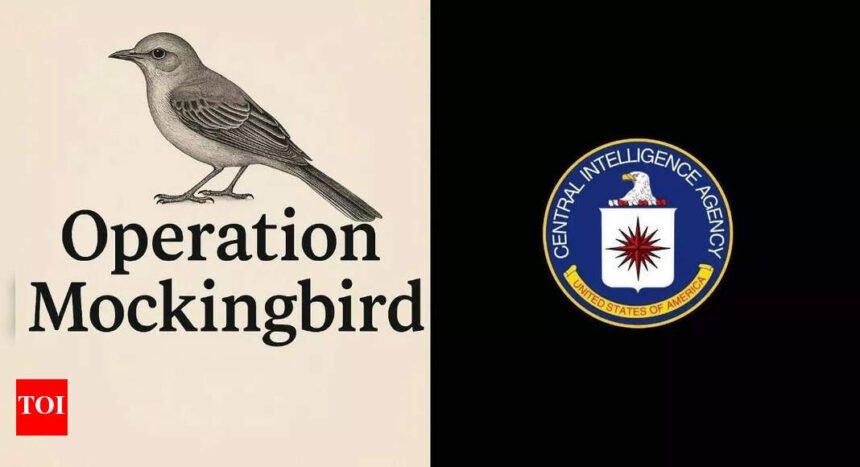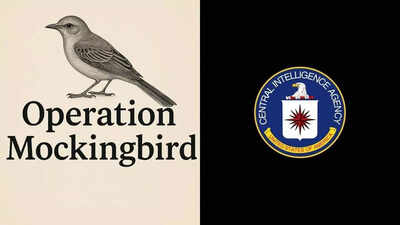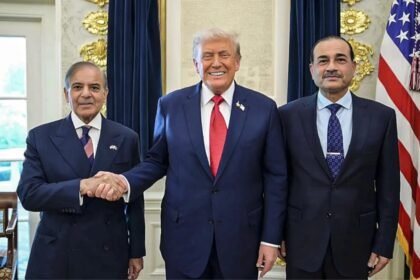Former congresswoman and Director of National Intelligence Tulsi Gabbard is making waves by claiming that Operation Mockingbird, a once-secret CIA media infiltration program, is still being used today to manipulate public perception and attack political figures like Donald Trump. Her explosive remarks have reignited interest in this decades-old Cold War program that allegedly turned some of the world’s most respected newsrooms into tools of US intelligence. Once dismissed as conspiracy theory, Operation Mockingbird was later confirmed through declassified documents and congressional testimony, revealing a chilling truth: America’s own media was being used to influence, distort, and sometimes deceive.The operation’s resurfacing in today’s political discourse has sparked debate not only about government transparency and media integrity, but also about the very meaning of democracy in the information age. The phrase “killing a mockingbird” takes on eerie new weight—not just as a nod to the iconic novel by Harper Lee, but as a metaphor for the silencing of truth and the betrayal of journalistic ideals.
What was Operation Mockingbird?
Operation Mockingbird was a covert program launched by the CIA in the late 1940s during the early Cold War. Its primary purpose was to influence both domestic and foreign media in order to promote US foreign policy goals and counter Soviet propaganda. Under this initiative, the CIA recruited leading journalists from major newspapers, magazines, and broadcasting networks, often with their knowledge—and sometimes without it.Revealed in part through the 1975 Church Committee hearings and later FOIA disclosures, Mockingbird extended to prominent media institutions like The New York Times, Time Magazine, CBS News, and others. Journalists were used to plant fabricated stories, shape narratives, and even pass along classified information under the guise of “leaks.” Some journalists were reportedly paid directly, while others collaborated due to ideological alignment with anti-communist efforts. Among the most cited examples:
- Joseph Alsop, a popular syndicated columnist, was on the CIA’s payroll and traveled abroad to report with agency guidance.
- CBS founder William Paley was known to cooperate with the CIA, allowing operatives access to journalists and overseas newsrooms.
- The New York Times and Time magazine were also named in connection with journalists who had ties to the CIA—some knowingly, others not.
- Frank Wisner, who headed the CIA’s Office of Policy Coordination, reportedly called the program his “Mighty Wurlitzer,” referring to the agency’s ability to play public opinion like a well-tuned instrument.
Why was operation Mockingbird started?
After World War II, the United States found itself locked in a psychological and ideological struggle with the Soviet Union. Information was the new weapon, and controlling the narrative was seen as essential to national security. The CIA, formed in 1947, quickly understood that propaganda was just as crucial as espionage.Operation Mockingbird began under CIA Director Allen Dulles and was orchestrated in part by Frank Wisner, who led the agency’s Office of Policy Coordination. He called it the “mighty Wurlitzer,” a metaphor for the way the agency could “play” global opinion like an organ, producing stories that supported American interests abroad and at home.
Major incidents and exposures
The full extent of Operation Mockingbird remained hidden until the 1970s, when investigative journalists like Carl Bernstein (of Watergate fame) and congressional inquiries started uncovering the CIA’s media ties. Bernstein’s 1977 exposé in Rolling Stone revealed that more than 400 American journalists had secretly carried out assignments for the CIA over the years.The most explosive revelations came during the Church Committee hearings in 1975, chaired by Senator Frank Church. The committee confirmed that the CIA had infiltrated major newsrooms and that some editors had knowingly allowed intelligence agents to use their platforms for disinformation. While the CIA claimed to have ended the practice in the late 1970s, no verifiable external oversight was ever put in place to ensure it truly stopped.
Echoes in the modern era: Tulsi Gabbard’s explosive claims
Fast forward to 2025, Tulsi Gabbard, now a prominent critic of the intelligence community, stated in a recent interview that “Operation Mockingbird never ended—it just evolved.” According to Gabbard, deep state elements within the CIA continue to feed intelligence selectively to sympathetic media outlets to shape political narratives. She alleges this has been used repeatedly to attack Donald Trump and suppress dissenting views.“There are people in the intelligence community who believe their will is more important than the will of the American people,” Gabbard said. “They weaponize intelligence by leaking it to their friends in the media with the intent of undermining President Trump’s agenda.”Though her statements are controversial, they reflect a broader public concern about the integrity of media in the digital age, especially when anonymous sources and government leaks play such a dominant role in shaping headlines.
Operation Mockingbird and the death of journalistic trust
Whether or not Operation Mockingbird in its original form still exists, the legacy of government influence over the media has left a permanent scar. In the age of disinformation, social media manipulation, and algorithmic echo chambers, critics argue that propaganda no longer requires covert agents—it thrives in the open.The damage Mockingbird caused wasn’t just about false narratives. It undermined the credibility of the press, sowed distrust among the public, and blurred the line between journalism and statecraft. The very institutions that were meant to hold power accountable had, in many cases, become part of the machinery of power itself.
A literary echo: Harper Lee and the silencing of innocence
The phrase “killing a mockingbird” is, of course, most famously associated with Harper Lee’s Pulitzer Prize-winning novel To Kill a Mockingbird, published in 1960. A poignant story about justice, morality, and racism in the American South, the novel’s title refers to the idea that it’s a sin to harm something innocent and pure—like a mockingbird.Lee, who passed away in 2016, was famously private and published only one other novel (Go Set a Watchman). Her work became a symbol of moral clarity and literary integrity. In contrast, the real Operation Mockingbird represents the opposite: the corruption of innocence in the public discourse, the co-opting of trusted voices, and the erosion of ethical storytelling.The metaphor is apt. Just as Harper Lee’s mockingbird stood for truth and goodness, the CIA’s covert campaign stood as an affront to those values—targeting not birds, but belief itself.
The ongoing debate: Conspiracy or continuity?
Skeptics argue that references to Operation Mockingbird today are exaggerated or misused as political weapons. There is no publicly available proof that the CIA is currently orchestrating media influence on the same scale as during the Cold War. But whistleblowers, declassified documents, and investigative reports continue to hint at covert relationships between intelligence agencies and media outlets.In an age of political polarization and information warfare, many believe the spirit of Mockingbird lives on—not as a centralized program, but as a culture of influence, leaks, and narrative control. The blurring lines between journalism, activism, and political advocacy only further complicate the matter.
Watch the skies—and the headlines
Operation Mockingbird serves as a stark reminder that the battle for truth often takes place behind closed doors. Whether it’s old-school newspaper editors or modern social media influencers, the question remains: Who’s shaping the story, and why?Tulsi Gabbard’s claims may stir controversy, but they also prompt a vital question—have we really put the ghosts of Mockingbird to rest, or have they simply migrated to a new nest in the digital age?In a world where truth is often the first casualty, understanding the past might be our best defense against repeating it.







